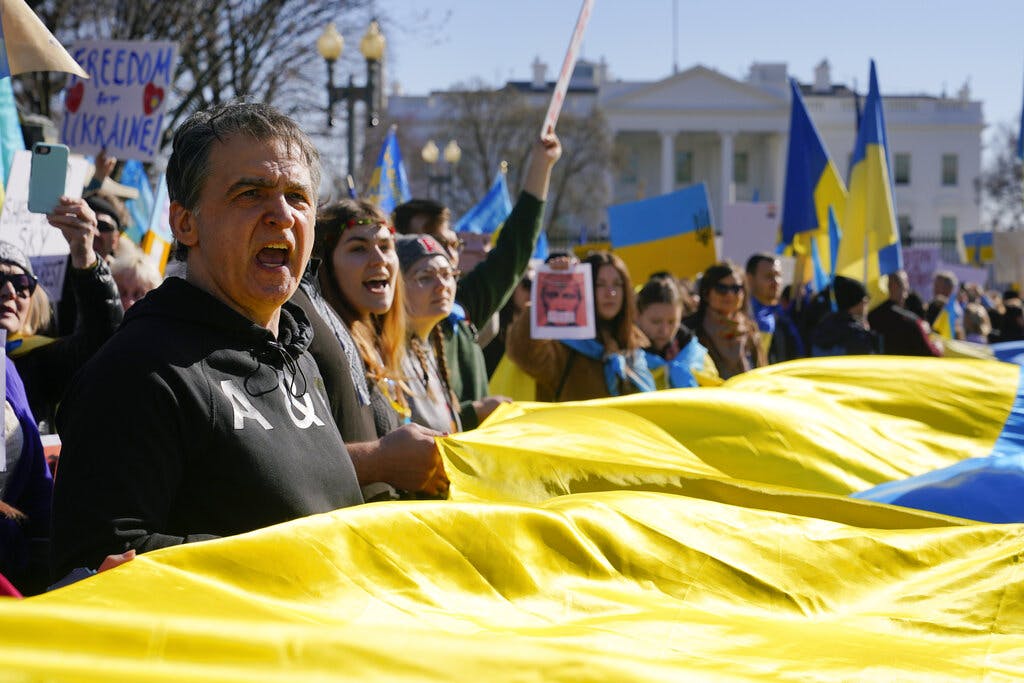Ruble Dives, Stocks Sink as West Tightens Russia Sanctions
Russian central bank raised its key rate to 20 percent from 9.5 percent in a desperate attempt to shore up the plummeting ruble and prevent a run on banks.

TOKYO (AP) — The ruble plunged to a record low of less than 1 U.S. cent and most global stock markets declined Monday after Western nations moved to block some Russian banks from a global payments system.
Russia’s invasion of Ukraine has caused markets to swing wildly, given the potential impact on inflation, energy supplies, and other economic repercussions.
President Putin’s order that Russian nuclear weapons stand at increased readiness to launch ratcheted up tensions with Europe and America and revived dormant fears from the Cold War era.
The Russian central bank raised its key rate to 20 percent from 9.5 percent in a desperate attempt to shore up the plummeting ruble and prevent a run on banks. That brought a temporary reprieve for the Russian currency, which bounced back to the level it was at last week, but only briefly.
The ruble has plunged more than 30 percent after the move to block Russian banks from the SWIFT payments system. The sanctions include restrictions meant to crimp the Russian central bank’s access to over $600 billion in reserves and hinder its ability to support the ruble.
A weaker ruble is expected to cause inflation to surge, potentially angering Russians whose budgets will be stretched by soaring prices. It will also add to strains across Russia’s financial systems.
Germany’s DAX fell 2.1 percent to 14,263.95 and the CAC 40 in Paris lost 2.3 percent to 6,595.83. Britain’s FTSE 100 shed 1.7 percent to 7,365.29.
In New York, the future for the S&P 500 was 1.6 percent lower and that for the Dow industrials declined 1.3 percent.
On Friday, the S&P 500 climbed 2.2 percent, notching its first weekly gain in three weeks. The Dow Jones Industrial Average rose 2.5 percent and the Nasdaq composite gained 1.6 percent. The Russell 2000 index rose 2.3 percent.
The end of the month usually brings a raft of economic data, but for now the conflict is eclipsing other issues.
“It’s all about the Russia-Ukraine situation and evolutions in that situation will drive market sentiment and direction,” Jeffrey Halley of Oanda said in a commentary.
“President Putin will now have to accept that the ‘Western’ powers are prepared to accept quite a bit of economic pain now to punish Russia,” he said.
Markets in Asia appeared to take the latest developments more calmly.
Japan’s Nikkei 225 index recovered from earlier losses to edge 0.2 percent higher to 26,526.82. The Hang Seng in Hong Kong lost 0.2 percent to 22,713.02. The Shanghai Composite index gained 0.3 percent to 3,462.31. The Kospi in Seoul climbed 0.8 percent to 2,699.18, while in Sydney the S&P/ASX 200 gained 0.7 percent to 7,049.10.
Although Asia is unlikely to suffer direct damage from the war in Ukraine, higher energy prices are an unwelcome burden for oil-importing nations like Japan, especially while they are still struggling to recover from the pandemic.
Underscoring deepening rifts due to the conflict, BP said Sunday it was exiting its 19.75 percent share in Rosneft, a state-controlled Russian oil and gas company, which it has held since 2013. That stake is currently valued at $14 billion.
Oil prices surged Monday, with U.S. benchmark crude up $4.33, or 4.7 percent, at $95.92 per barrel in electronic trading on the New York Mercantile Exchange. It lost $1.22 to $91.59 per barrel on Friday.
Brent crude gained $4.20 to $98.32 per barrel, up 4.5 percent and approaching the $100 per barrel level it breached last week.
The Ukraine conflict has heaped uncertainty atop other worries over interest rates and inflation.
The U.S. Federal Reserve has suggested it will raise short-term interest rates next month by double its usual increase, the first rate increase since 2018. Higher U.S. rates tend to put downward pressure on all kinds of investments, and can have global repercussions.
In currency trading, the U.S. dollar inched down to 115.61 Japanese yen from 115.77 yen. The euro rose to $1.1165 from $1.1157.
